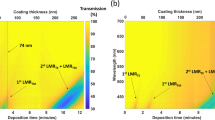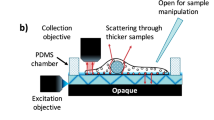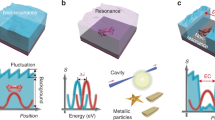Abstract
A NEED exists for a method of detecting small amounts of chemicals in air and other gases, and in solutions, simply, and with a high degree of sensitivity. We have developed a new technique based on the concept of using waveguide phenomena in combination with chemical reactions. This technique is applicable to a wide variety of chemical reactions, including biochemical systems, provided that they cause a change in light transmittance by virtue of a change in colour, refractive index, or light scattering. Both real-time and cumulative measurements are possible.
This is a preview of subscription content, access via your institution
Access options
Subscribe to this journal
Receive 51 print issues and online access
$199.00 per year
only $3.90 per issue
Buy this article
- Purchase on Springer Link
- Instant access to full article PDF
Prices may be subject to local taxes which are calculated during checkout
Similar content being viewed by others
References
Kapany, N. S., Fiber Optics (Academic, New York, 1967).
Kapany, N. S., and Burke, J. J., Optical Waveguides (Academic, New York, 1973).
Feigl, F., Spot Tests in Organic Analysis (Elsevier, New York, 1958).
Author information
Authors and Affiliations
Rights and permissions
About this article
Cite this article
HARDY, E., DAVID, D., KAPANY, N. et al. Coated optical guides for spectrophotometry of chemical reactions. Nature 257, 666–667 (1975). https://doi.org/10.1038/257666a0
Received:
Accepted:
Issue Date:
DOI: https://doi.org/10.1038/257666a0
This article is cited by
-
Low-cost fiber-optic waveguide sensor for the colorimetric detection of ammonia
Microsystem Technologies (2012)
Comments
By submitting a comment you agree to abide by our Terms and Community Guidelines. If you find something abusive or that does not comply with our terms or guidelines please flag it as inappropriate.



